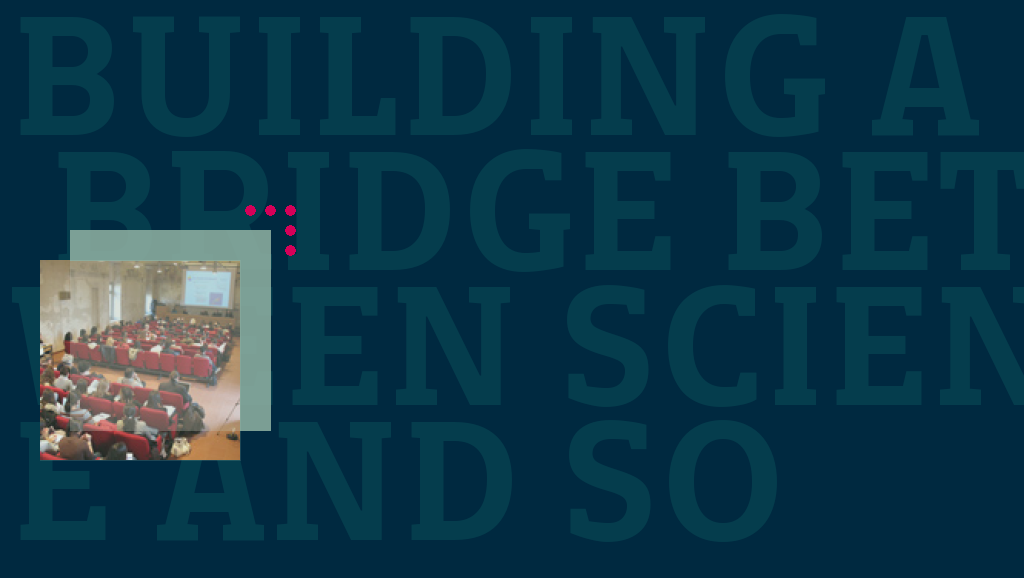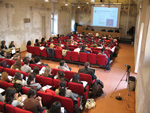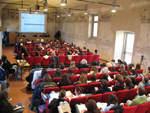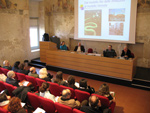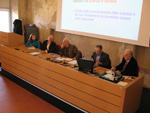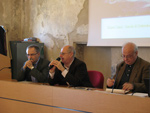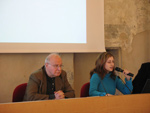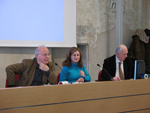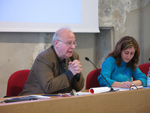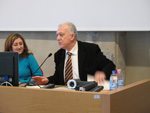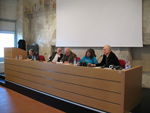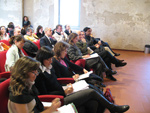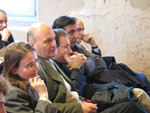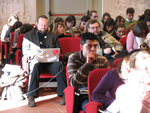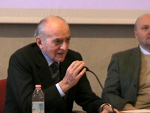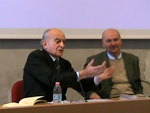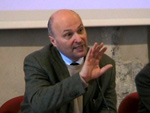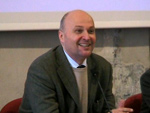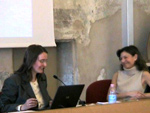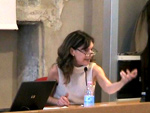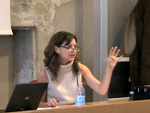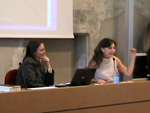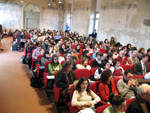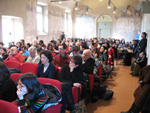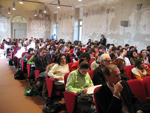Looking for the foundations of the communication of science. (Bergamo, February 14-15 2008)
by Roberta Gabbatore
On Thursday 14th February 2008 in the splendid setting of the ex monastery of Saint Augustine (now part of the University) in Bergamo’s upper town the conference “Building a bridge between science and society. Looking for the foundations of the communication of science” took place.
The two day study event was organized by the doctoral school of Anthropology and the Epistemology of Complexity of the University of Bergamo and the International school of Advanced Studies SISSA in Torino in conjunction with the Giannino Bassetti Foundation, and produced an extremely rich and articulated debate on the relationships that today intertwine between science, politics and society.
The inaugural speeches by Mauro Ceruti and Piero Greco highlighted the fact that there cannot be science without communication: while in the past there was a belief in the “River Amazon model” in which scientific research took a course that was pre-determined by the flow of knowledge and the diffusion of knowledge from the spring of science to the sea of popularisation, the “Venice model” is now seen as valid, a thousand islands of epistemic statutes with a thousand communication bridges.
In the “Communication and Construction of Science” session co-ordinated by Gianluca Bocchi , Giuseppe O. Longo pointed out how the importance of technoscience for our society should make one think about the ethical aspects of both the research activity itself and its communication, and based on this the problems related to fund-seeking for research and the marketability of its products should be more closely studied. In general funding is only given to research projects that can promise results and applications over a short period of time. There are also the needs of society: in a context of codified values it is sometimes difficult to make research understood and accepted. Especially in the medical field exaggerating results and possible applications can falsely raise sufferers’ hopes.
Silvano Tagliagambe, speaking about the sense of the “representation of knowledge” underlined how ambiguity and even misunderstanding between different semiotic worlds can lead to a nevertheless fruitful condition of uncertainty that can become a source of innovation.
The “communicating science responsibly” session saw the first presentation of the Italian publication of the report Taking European Knowledge Society Seriously. Report to the Science, Economy and Society Directorate, commissioned by the Director General for Research of the European Commission. The first intervention by Piero Bassetti reflected upon a question, “is it possible to think about the communication of science as a new contribution in analysing the relationship between science and society?” Innovation can be defined as the realization of the improbable and is distinct from science in that it is not part of a discovery but it is not either merely a question of knowledge. Neither is it only a fact of power – by which one means the presence of capital and technology – but rather “innovation is realization, the implementation of something that was formerly improbable, not only because it was unknown but also not possible (technically) or not hoped for (risk). Therefore innovation is not only a question of knowledge, nor of power but also of will. It is in this point that the theme of responsibility manifests itself.
“Responsibility comes from the use of power, not of knowledge, you cannot ask knowledge to become responsible. You need however to ask it of power. This is why one has to clearly see the problem of the governance of knowledge (provided that it is possible of course) which is anyway very different from that of the governance of innovation.”
This critical and problematic question has been posed in the report Taking European Knowledge Society Seriously, translated and published in Italian upon the initiative of the Bassetti foundation.
Cristina Grasseni, scientific director of the foundation explained how the report was commissioned to a group of experts to enhance the strategy of the Lisbon Agenda: to transform the EU into a knowledge society that is competitive in the international technoscience market. The report proposes a critique of the notion of the knowledge society as represented by the Lisbon agenda and in the way it has been interpreted and imposed in the political, legislative, communicative and administrative life of the European Commission.
Mariachiara Tallacchini, translator of the report and member of the expert group chaired by Brian Wynne, underlined that the European Commission lacked the STS view; no report had ever been explicitly produced from the Science and Technology Studies point of view. Nicole Dewandre, who for some time had been working on the theme of Science and Governance, organized a group of experts with Brian Wynne that could be the European and international expression of this approach. Aiming to raise “institutional self consciousness” they argue that “public fear in the face of science is not produced by a deficit of knowledge, but by the perplexity that people hold for the institutions; the problem therefore regards policy and the way in which the argument between science and society, and science and the institutions is presented”.
In the “Communication and Identity of Science” session co-ordinated by Pietro Greco, Paola Govoni historically re-drew the popularisation of science since the enlightenment. The history of the rise and fall of “science for everybody” seems to show that some of the main problems between science and the Italian public are rooted in the problems of low educational achievement levels.
Fabio Bevilacqua discussed the challenge of participative media, underlining that a new scientific and technological revolution is under way that makes it possible to decrease the gap between “science” and “society” allowing for the participation of an ever growing “public”. New digital technology opens new frontiers and great opportunities.
Enrico Gianetto proposed science as a complex historical activity, a continuous research that constructs a very different image of nature instead of a mechanical representation: nature is never fully under control, uncertain in its essence and complex evolutionary dynamics, gaining the total respect of mankind but at the same time mysterious and spell binding. The illusion of a mechanical explanation in which everything is absolutely exact is unsustainable.
The day finished with the lectio magistralis by Claude Fischler, Director of the Edgar Morin Research Centre in Paris who focused in particular on the perception of risk in food from an intercultural perspective, based on sociological analysis not only of “citizens” in general but also of experts: doctors, technicians and producers.
In the session on “Communication of science, public perception and education” held on Friday 15th February the problem of teaching scientists to speak in public was raised. Agnes Allansdottir, a Psychologist of communication put the key question in a nutshell: how can one democraticaly control science? And what does one do in the face of expensive governmental debates, assemblies and online forums, if public opinion clearly goes against those with big interests, capable of lobbying at government level? The risk, states Giuseppe Pellegrini, is that you strengthen the split between a politics that knows little of science, an elite of researchers that do not bear in mind contemporary debates within society and frustrated citizens demonstrating in the streets. Deliberative processes that begin prior to making choices and ensuing emergencies should confront technical data but also the values at stake, and should also give citizens controlling functions in order to empower them.
